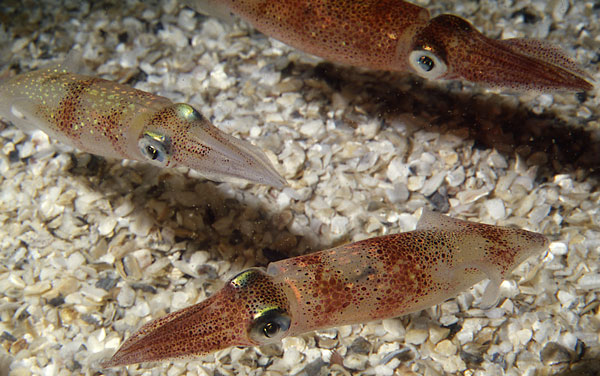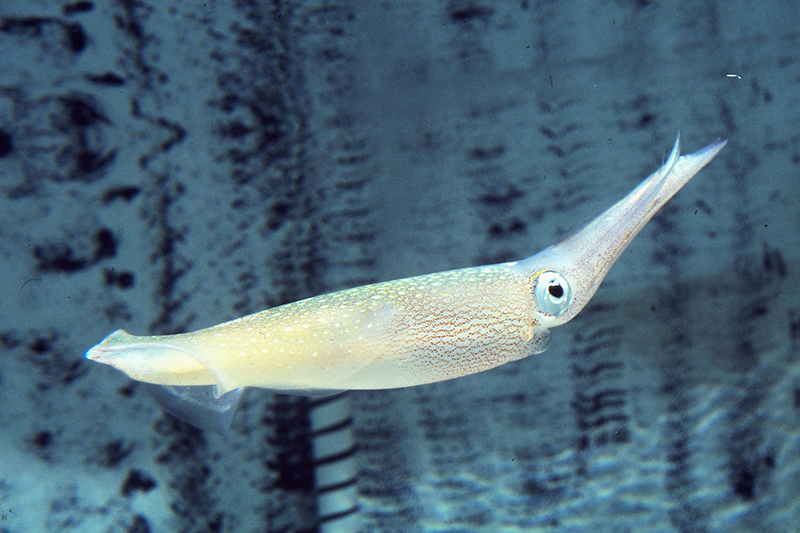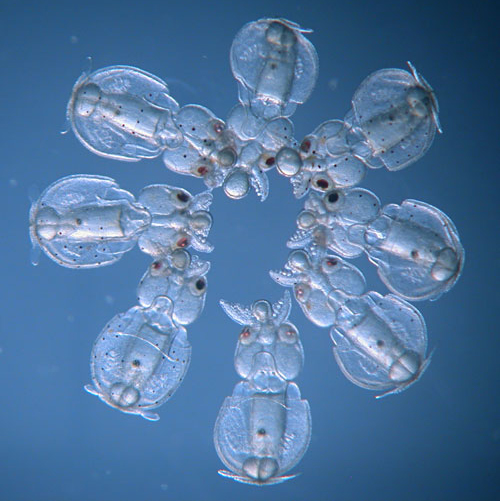A Spotlight on Cephalopod Research

Since 2008, scientific organizations around the world have celebrated International Cephalopod Awareness Days from October 8 to 12 to highlight the group of marine animals that includes octopus, squid, cuttlefish, and nautilus.
Did you know that the MBL has the biggest cephalopod culture operation in the United States? Right now, there are roughly 1,500 animals across nine cephalopod species in our Woods Hole facility. Beyond our Cephalopod Mariculture program, MBL researchers are busy studying these fascinating invertebrates. From field work in Indonesia to gene knockouts and genome sequencing, there have been a lot of exciting cephalopod stories at the MBL this year.
Sequencing a Giant
In January, a University of Copenhagen-led team that included MBL scientist Caroline Albertin sequenced the full genome of the mysterious giant squid (Architeuthis dux). Because giant squid are rarely sighted and have never been kept alive, much of their biological processes remains a mystery. The team hopes the genome could provide important insight on everything from reproduction and camouflage to how they acquired the largest brain among invertebrates.
Self-Editing Squid
 The longfin inshore squid (Doryteuthis pealeii) Credit: Roger Hanlon
The longfin inshore squid (Doryteuthis pealeii) Credit: Roger HanlonThis year, MBL scientists discovered that squid edit their own genetic instructions not just within the nucleus of their neurons, which was the conventional wisdom, but also within the axon—the long, slender projections that transmit electric impulses to other neurons. This is the first time that edits to genetic information have been observed outside of the nucleus of an animal cell. The study, led by Isabel C. Vallecillo-Viejo and Joshua Rosenthal, was published in Nucleic Acids Research in March.
A New Route to ALS Therapy
 Doryteuthis pealeii. Credit Roger Hanlon
Doryteuthis pealeii. Credit Roger HanlonAmyotrophic lateral sclerosis (ALS) affects thousands of people in the United States every year. The fatal adult-onset neurodegenerative disease leaves those affected progressively weaker and eventually paralyzed as their motor neurons degenerate and die. During her Grass Fellowship at the MBL, Yuyu Song of Harvard Medical School worked with the local squid (Doryteuthis pealeii) to examine how a mutant protein associated with ALS behaves under controlled conditions. Her study, which was published in eNeuro, clarifies the mechanisms underlying neural dysfunction in ALS, and suggests a novel approach to restoring the health of motor neurons in patients with the disease.
A Knock-Out Achievement
 Ring of squid hatchling mosaics (Doryteuthis pealeii).
Ring of squid hatchling mosaics (Doryteuthis pealeii).Credit: Karen Crawford
There was big news in the cephalopod world this summer. A team at the MBL achieved the first gene knockout in a cephalopod using the squid Doryteuthis pealeii. The team, led by MBL scientists Joshua Rosenthal and Karen Crawford, used CRISPR-Cas9 genome editing to knock out a pigmentation gene in squid embryos. This eliminated pigmentation in the eye and skin cells of the squids. The ability to knock out a gene to test its function is an important step in developing cephalopods as genetically tractable organisms for biological research, augmenting the handful of species that currently dominate genetic studies, such as fruit flies, zebrafish, and mice.
Flashy, Flamboyant Displays
With a name like the flamboyant cuttlefish, you probably expect Metasepia pfefferi to spend all their time flashing their bright, hypnotic colors, but a paper from MBL Senior Scientist Roger Hanlon set the record straight. The flamboyant cuttlefish saves its bright display for special occasions only. Specifically: fighting, fleeing, and mating. From courtship to mating to egg laying, the study gleaned new observations about one of the most popular cephalopod species from hours of video taken during many SCUBA dives in Indonesia with teams of volunteers.